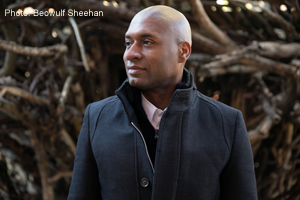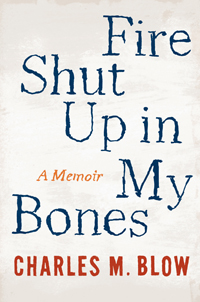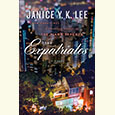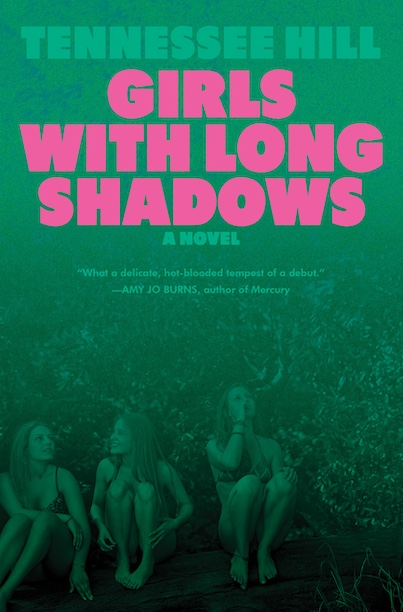Leaving Home
New York Times columnist Charles M. Blow recalls his difficult youth in Fire Shut Up in My Bones
Columnists at The New York Times are an eminently readable lot, but even at their most righteous or irreverent, there’s always something a little bland about their voices. It’s inevitable—the Gray Lady, after all, is the newspaper of record, the premier vehicle for U.S. mainstream journalism, and even her star players aren’t allowed to disrupt her perfect respectability. So it’s a little startling to open Fire Shut Up in My Bones, a memoir by op-ed columnist Charles M. Blow, and find him speeding down a Louisiana highway, rusty pistol on the passenger seat beside him, on his way to kill a man. In the 200+ pages that follow, Blow tells the story of how he came to that moment—which happened when he was a college student—and rose above it to save himself, as well as his intended victim. In the telling he reveals a great deal about what carried him from his difficult early life to a coveted perch at the Times.
 Blow, who is African American, grew up in Gibsland, Louisiana, a small rural town “halfway between Shreveport and Monroe and right in the middle of nowhere.” Like most small Southern communities, then and now, the town was racially segregated, with “whites and blacks mostly separated by a shallow ditch and a deep understanding.” Blow’s family lived in a dilapidated home—“The House With No Steps”—in the close-knit black community of Gibsland, where little Charles was affectionately known as Char’esBaby or Chocolate.
Blow, who is African American, grew up in Gibsland, Louisiana, a small rural town “halfway between Shreveport and Monroe and right in the middle of nowhere.” Like most small Southern communities, then and now, the town was racially segregated, with “whites and blacks mostly separated by a shallow ditch and a deep understanding.” Blow’s family lived in a dilapidated home—“The House With No Steps”—in the close-knit black community of Gibsland, where little Charles was affectionately known as Char’esBaby or Chocolate.
Everything was not cozy, however. Blow’s parents had a tumultuous marriage, to put it mildly. “The only time I ever saw a person actually shoot a gun at another,” Blow writes, “I was five years old, and it was my mother shooting at my father.” After the unhappy couple split, the family was so poor the children searched the dump for toys, and their mother scavenged the wreckage of cargo trucks that overturned on the nearby interstate. Their father was largely absent and always emotionally unavailable. “Never once did he hug me, never once a pat on the back or a hand on the shoulder or a tousling of the hair,” Blow recalls. “I mostly experienced him as a distant form in a heavy fog.”
A loving extended family softened the troubles in Blow’s young life, but they brought danger, too. At age seven, Blow was sexually molested by an older male cousin, and there was a second instance of abuse by an uncle when Blow was ten. These incidents gave an already introspective kid a powerful reason to withdraw and doubt himself. “I could find no real place for myself in the world,” he writes, recalling how he spent hours alone in an abandoned house, drawing and daydreaming. Persistent fantasies—not exactly sexual, but not exactly non-sexual—about men troubled him, and it didn’t help that he was shamed by his mother, who knew nothing of the abuse, for being effeminate: “It was clear to me that she was worried I wasn’t turning out right, that I was sliding down an unspeakable path to an unspeakable end.”
 Blow carried his secret anxiety into his college years at Grambling State University, where he survived brutal fraternity hazing in part, he believes, because of his past trauma. “The link between me and my body had long ago been severed,” he writes, and while he found he was not attracted to his frat brothers, he did court and thrive on their admiration. His insecurity-fueled ambition made him a success on campus and off. He became president of his fraternity. Sheer moxie and his artistic gifts, first nurtured during those childhood hours alone, got him a graphics internship at the Times, one the paper created just for him.
Blow carried his secret anxiety into his college years at Grambling State University, where he survived brutal fraternity hazing in part, he believes, because of his past trauma. “The link between me and my body had long ago been severed,” he writes, and while he found he was not attracted to his frat brothers, he did court and thrive on their admiration. His insecurity-fueled ambition made him a success on campus and off. He became president of his fraternity. Sheer moxie and his artistic gifts, first nurtured during those childhood hours alone, got him a graphics internship at the Times, one the paper created just for him.
It was during this time that his first abuser resurfaced, triggering Blow’s buried rage and leading to that dramatic moment in the car. For Blow, the decision that night not to kill his cousin was the turning point in his life. The trauma that had made him tough and determined to succeed, he understood, was going to rob him of that success: “Seeing him lying in a pool of his own blood might finally liberate me from my past, but it would also destroy my future.” He resolved to make peace with what he had suffered and put aside forever the culture of righteous violence he’d grown up with, seeing that “the ways of people on the west side of Gibsland were not necessarily the best ways.”
Blow, unsurprisingly, delivers his story in a highly readable style, and he renders the life of Gibsland in novelistic detail. His account of fraternity culture at Grambling is harrowing but offers a fascinating glimpse into a world many of his regular readers at The New York Times probably know little about. Fire Shut Up in My Bones is a remarkable twist on the classic rags-to-riches saga, written with considerable psychological insight and great honesty about the unhappy motivations that can lurk behind ambition.

Maria Browning is a fifth-generation Tennessean who grew up in Erin and Nashville. A graduate of Mount Holyoke College, she has attended the Clothesline School of Writing in Chicago, the Moss Workshop with Richard Bausch at the University of Memphis, and the Sewanee Writers’ Conference. She lives in White Bluff.


